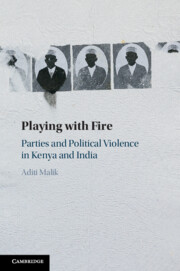Book contents
- Playing with Fire
- Playing with Fire
- Copyright page
- Dedication
- Contents
- Figures
- Tables
- Acknowledgments
- Abbreviations
- 1 Parties and Political Violence
- 2 A Theory of Party Instability and Political Violence
- 3 The Development of Divergent Parties and Party Systems in Kenya and India
- 4 Party Instability and Political Violence in Kenya
- 5 Party Fragility and Subnational Patterns of Violence in Kenya’s Rift Valley and Coast Regions
- 6 Party Stabilization, Declining Riot Violence, and New Modalities of Political Conflict in India
- 7 Party Politics and Subnational Trajectories of Riot Violence in India’s Hyderabad and Meerut Cities
- 8 Party Instability and Political Violence
- 9 Conclusion
- Book part
- References
- Datasets
- Index
2 - A Theory of Party Instability and Political Violence
Published online by Cambridge University Press: 25 October 2024
- Playing with Fire
- Playing with Fire
- Copyright page
- Dedication
- Contents
- Figures
- Tables
- Acknowledgments
- Abbreviations
- 1 Parties and Political Violence
- 2 A Theory of Party Instability and Political Violence
- 3 The Development of Divergent Parties and Party Systems in Kenya and India
- 4 Party Instability and Political Violence in Kenya
- 5 Party Fragility and Subnational Patterns of Violence in Kenya’s Rift Valley and Coast Regions
- 6 Party Stabilization, Declining Riot Violence, and New Modalities of Political Conflict in India
- 7 Party Politics and Subnational Trajectories of Riot Violence in India’s Hyderabad and Meerut Cities
- 8 Party Instability and Political Violence
- 9 Conclusion
- Book part
- References
- Datasets
- Index
Summary
This chapter details the book’s theoretical model, focusing first on elites’ decisions and then on voters’ reactions. It highlights how expected party lifespan stands to impact leaders’ decision-making about violence by shortening or lengthening their time horizons. Politicians operating with truncated time horizons will display a higher propensity for organizing or sponsoring party conflict than their counterparts with lengthy time horizons. The chapter thus holds that the effect of party instability on elite choice is conditioning rather than determinative. While unstable parties do not cause violence, they can incentivize elites to engineer or sponsor violence in certain contexts.
Keywords
Information
- Type
- Chapter
- Information
- Playing with FireParties and Political Violence in Kenya and India, pp. 30 - 50Publisher: Cambridge University PressPrint publication year: 2024
